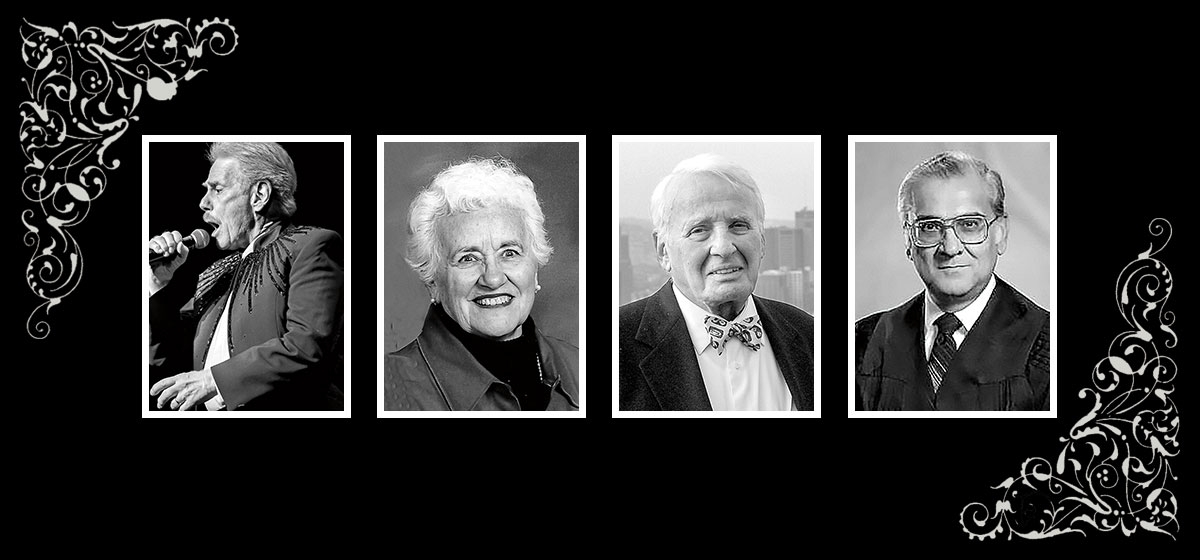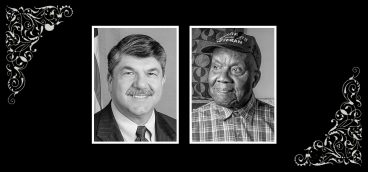Burger, Beaumont, Fincke, Lowry, Frankel, Papadakos, Dozzi, Troan

Herb Burger, 87: A leading Pittsburgh advertising executive, Burger led the PR effort that created the 1980s slogan, “Pittsburgh: The city with a smile on its face” while president of Creamer Inc. After the firm was sold, Burger started the St. George Group. He was the first chairman of the Pittsburgh Downtown Partnership, and was an inveterate Pittsburgh booster.
Jimmy Beaumont, 76
The front man for the Pittsburgh group The Skyliners, Beaumont was immortalized for writing the music for and singing the vocals on the timeless 1959 classic, “Since I don’t have you.” With that song, the Skyliners became the first white group to top the R&B charts, and Beaumont, a humble, friendly man from Pittsburgh’s Knoxville section, had a song he would sing to appreciative audiences for the rest of his life.
Mildred “Millie” Fincke, 90
She wanted to become a nurse since she was a little girl in Etna, and she became a national leader in the field, serving first as head nurse in the Allegheny General Hospital emergency room on the way to becoming vice president of nursing. The nurse practitioner program she created became a national model, and she was the driving force for creating the hospital’s LifeFlight rescue service, the first in the northeastern U.S.
William Lowry, 80
After engineering the merger of Blue Cross of Western Pennsylvania and Pennsylvania Blue Shield, Lowry became CEO of the resulting new company, Highmark. He was a champion of hiring people with disabilities and was active in many organizations including the Juvenile Diabetes Foundation, Carlow College and Catholic Charities.
Robert Frankel, 89
Frankel was a successful businessman and leading Pittsburgh arts patron. Smart, dignified and friendly, he was vice chairman of Hilb, Rogal and Hamilton, which had purchased the Frankel family’s longtime regional insurance business. As board president of City Theatre, he led an unprecedented capital campaign that allowed the struggling nonprofit to find and establish its permanent South Side home. And as chairman of the Three Rivers Arts Festival, he pulled the organization into the black. He also served on boards of the Carnegie Museum of Art, Pittsburgh Center for the Arts and Pennsylvania Council on the Arts.
Nicholas Papadakos, 92
Papadakos was a McKeesport solicitor who rose to serve 11 years on the Pennsylvania Supreme Court. His 1983 Common Pleas Court decision to essentially effect a moratorium on home foreclosures of the recently unemployed at the height of steel’s collapse paved the way for his election to the state’s high court. As an Army sergeant in World War II he received four Bronze Stars.
Peter Dozzi, 87
The son of immigrants and the first of his family to graduate from college, Dozzi founded Jendoco Construction in the basement of his father’s home 60 years ago. It became one of Pittsburgh’s leading firms, having constructed scores of signature buildings in the region including Winchester Thurston, Pitt’s School of Law, the Water Works, South Side Works, Carnegie Museum’s Dinosaur Hall, and the Duquesne University Power Center.
John Troan, 99
As a young reporter, he changed his name from Troanovitch because editors kept misspelling it. He rose to become editor of The Pittsburgh Press from 1967 to 1983, the city’s powerful afternoon paper that closed in 1992. Troan’s career, however, was best known for the biggest story he ever covered, the development of the polio vaccine by Dr. Jonas Salk at the University of Pittsburgh.






